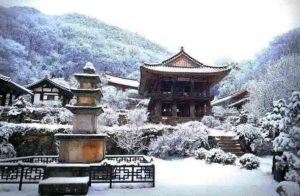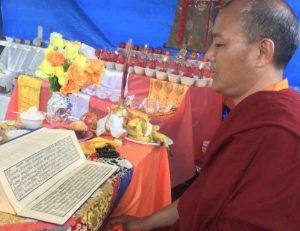
While the ultimate goal of Buddhism is liberation from the suffering of samsara, it is important for Buddhists to benefit other beings in samsara and to contribute to helping society. The teachings of the Buddha emphasize the importance of becoming one’s own refuge, which underscores the value of self-reliance as a profound spiritual path for addressing and overcoming the myriad challenges facing humanity. However, Buddhism does not promote passive resignation to suffering. Rather, it advises and motivates us to actively participate in the betterment of our communities.
The compassionate actions of numerous Buddhists who participate in community-building, charitable work, and social justice are indicative of this pursuit of improvement. They understand that, although it is imperative to pursue enlightenment and liberation, it is equally crucial to establish a meaningful community life.
Mainstream religious movements have usually emphasized the importance of communal tolerance and non-discrimination among believers, communities, and nations. However, the practical reality of developing this tolerance is uncertain and lacking in many societies, as seen by acts of civil strife, discrimination, and violence in various nations. Very often, the exercise of tolerance seems like an untrained muscle, which grows weaker the longer it is left unused.
A recent example is the violence in the Chittagong Hill Tracts of Bangladesh, where hundreds of shops belonging to indigenous communities were vandalized, looted, and set on fire. This happened after the resignation of former prime minister Sheikh Hasina in the face of the Student-People’s Uprising of July. Bengali Muslims also targeted Buddhist temples, vandalizing Buddha statues and looting donation boxes. Four indigenous people were killed in those incidents and many others were injured. As a result, communal violence has become an especially sensitive and urgent issue.

Buddhist tolerance of other religious communities
In the ancient Buddhist scriptures, the Buddha acknowledges the right of other religions to exist. According to the Upali Sutta of the Majjhima Nikaya, Upali, a well-known disciple of Nigantha Nataputta, the religious leader of Jainism, became a disciple of the Buddha. But the Buddha advised him to maintain his acts of donations toward his former religious teacher and his disciples: “Householder, your family has long supported the Nigaṇṭhas and you should consider that alms should be given to them when they come.” (Ñāṇamoli and Bodhi, 484) Upali was overjoyed by the Buddha’s instruction and responded by saying:
Venerable sir, I am even more satisfied and pleased with the Blessed One for telling me that. Venerable sir, I have heard that the recluse Gotama says thus: “Gifts should be given only to me; gifts should not be given to others. Gifts should be given only to my disciples; gifts should not be given to others’ disciples. Only what is given to me is very fruitful, not what is given to others. Only what is given to my disciples is very fruitful, not what is given to others’ disciples.” But, on the contrary, the Blessed One encourages me to give gifts to the Nigaṇṭhas. (ibid., 484–85)
Furthermore, in the Sigalaka Sutta of the Digha Nikaya, the Buddha encourages Sigalaka to treat all religious teachers with respect and generosity. As the sutta says, a student should show respect to a teacher in five ways: by rising from his seat in salutation, by attending on him, by being eager to learn, by providing personal service, and by paying respectful attention while receiving instructions. In this regard, we can infer that the Buddha never condemned any faith.
Bridging divides through compassionate action and dialogue
In 2015, a high-level summit, titled “Overcoming Extremism and Advancing Peace with Justice,” was held in Yogyakarta, Indonesia. The International Forum on Buddhist-Muslim Relations sponsored the summit, which was hosted by the Indonesian Buddhist Association and the Indonesian Council of Ulama. Buddhist and Muslim officials from 15 nations attended. At its conclusion, they issued the “Yogyakarta Statement,” which proclaimed that “Islam and Buddhism are religions of mercy and compassion committed to justice for all humankind.” Both traditions “respect the sacredness of life and inherent dignity of human existence, which is the foundation of all human rights without any distinction as to race, color, language, or religion.” They additionally urged on every country to “take measures to fulfill their responsibilities to protect their citizens from religious and racial hatred, and incitement to discrimination and violence in the name of religion.” (International Forum on Buddhist-Muslim Relations)
A number of well-known socially engaged Buddhist leaders also have attracted attention on a global scale as a result of their responses to acts of war, invasion, military aggression, as well as their attempts to avoid and end conflict within different communities. They included prominent figures such as Preah Maha Ghosananda (1913–2007) in Cambodia, A. T. Ariyaratne in Sri Lanka (1931–2024), and Thich Nhat Hanh (1926–2022) in Vietnam. Sadly, all three magisterial names in Buddhist peacemaking are no longer with us.

Preah Maha Ghosananda believed that meditation is essential for maintaining internal and external stability. His personal story demonstrates how meditation was an essential part of his preparation for effective peace ministry. He used meditation practices such as metta (loving-kindness), samadhi (concentration), and vipassana (insight) to achieve inner peace and to direct that serenity and tranquility outward, radiating from a strong, trained interior base.
A. T. Ariyaratne, the leader of Sri Lanka’s Sarvodaya Shramadana Movement, first received international attention for his efforts in development, but he then moved his focus to the country’s civil war. During Sri Lanka’s long-running conflict from 1983–2009, Sarvodaya was a key advocate for peace. For many years, Sarvodaya conducted peace marches and communal meditations in response to the horrific riots, drawing on its Gandhian heritage of nonviolence and peace.
During the Vietnam War of 1955–75, there was an anti-war movement that attempted to cease hostilities and negotiate a peaceful solution between North and South Vietnam. During this urgent and catastrophic period, Thich Nhat Hanh developed the idea of engaged Buddhism. He wrote:
When bombs begin to fall on people, you cannot stay in the meditation hall all of the time. Meditation is about the awareness of what is going on – not only in your body and in your feelings, but all around you. When I was a novice in Vietnam, we young monks witnessed the suffering caused by the war and were very eager to practice Buddhism in such a way that we could bring it into society. That was not easy because the tradition did not directly offer Engaged Buddhism, so we had to do it by ourselves. That was the birth of Engaged Buddhism. Nhat Hanh, 2003)

Thich Nhat Hanh explains his position on conflict and peace in the 10th mindfulness training, “Protecting and Nourishing the Sangha,” as follows:
Aware that the essence and aim of a Sangha is the practice of understanding and compassion, we are determined not to use the Buddhist community for personal power or profit, or transform our community into a political instrument. As members of a spiritual community, we should nonetheless take a clear stand against oppression and injustice. We should strive to change the situation, without taking sides in a conflict. . . . We will actively build brotherhood and sisterhood, flow as a river, and practise to develop the three real powers – understanding, love, and cutting through afflictions – to realise collective awakening. (Nhat Hanh 2020, 136)
The early Buddhist texts teach that contentment is a subjective quality rooted in the individual, arising from the eradication of greed, hatred, and delusion. Internal peace (Pali: ajjhatta-santi) results from the complete cessation of the defilements. The Buddha emphasized the inner dimension of moral precepts over purely external social behaviours. Buddhism asserts that its moral principles possess a psychological element, reflecting the role of the individual’s own initiative and moral agency.
But if the Buddha emphasized the subjective aspect of the moral precepts over the purely exterior social actions, it must be acknowledged that our psychological conditions are also shaped by broader social needs. It is therefore misleading to characterize the Buddhist tradition as one that overlooks social issues or promotes withdrawal instead of engagement. Rather, they feed into each other, mutually influencing one another.
Furthermore, given the political context of the violence inflicted on Buddhists by Muslims in August, along with the intensely political backdrop of the three grandees of peace I mentioned (namely the Cambodian genocide, the Vietnam War, and the Sri Lankan Civil War), Buddhists inevitably need to move toward political solutions borne out of compassion and wisdom for peace to be lasting and effective.
References
Malkin, John. 2003. “In Engaged Buddhism, Peace Begins with You: Thich Nhat Hanh, who originated Engaged Buddhism, in an interview with John Malkin.” Lion’s Roar.
Ñāṇamoli, Bhikkhu and Bhikkhu Bodhi. 1995. The Middle Length Discourses of the Buddha: A Translation of the Majjhima Nikāya. Boston: Wisdom Publications.
Nhat Hanh, Thich. 2020. The 14 Mindfulness Training of Engaged Buddhism. Berkeley: Parallax Press.
See more
Yogyakarta Statement – Shared Values and Commitments (International Forum on Buddhist-Muslim Relations)
Related features from BDG
A Moment with Dr. A. T. Ariyaratne
A Buddhist Approach to Interreligious Conflict and Harmony
Maha Ghosananda: Cambodia’s Great Advocate for World Peace
The “Yogyakarta Statement”: Guidelines for Religious Harmony and Communal Stability
From Buddhist and Christian Practices to Societal Harmony: A Conversation in Hong Kong
Related news reports from BDG
Jogye Buddhist Order Condemns Perceived Religious Bias in South Korea
Religious Harmony Sought after Sri Lankan Comedian Arrested for “Defaming Buddhism”
Young Buddhist Association of Indonesia Holds Interfaith Dialogue on Religious Moderation












